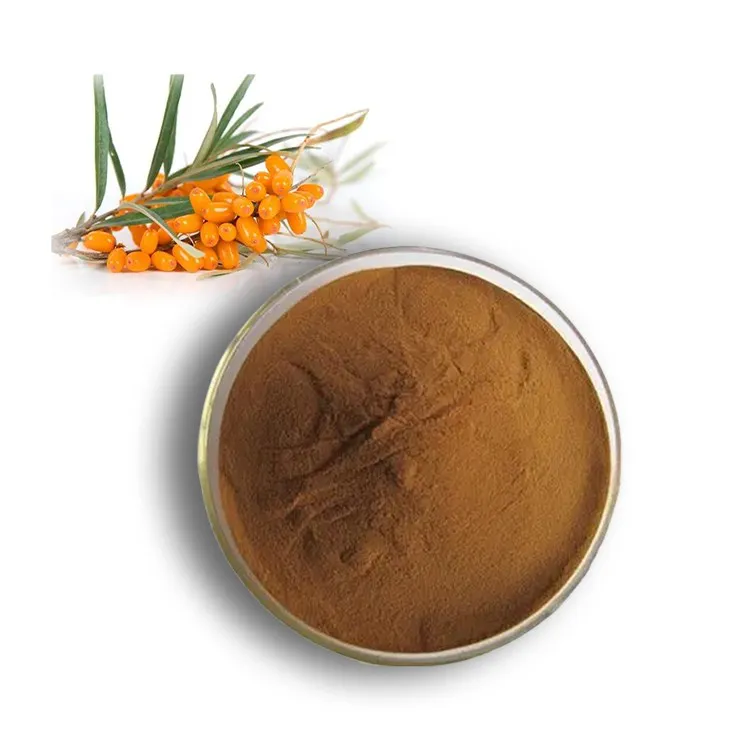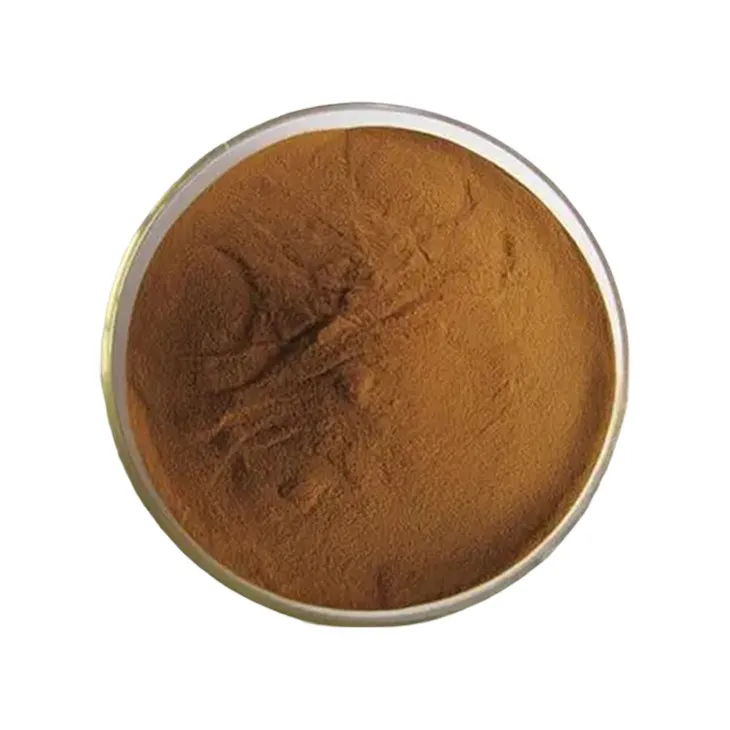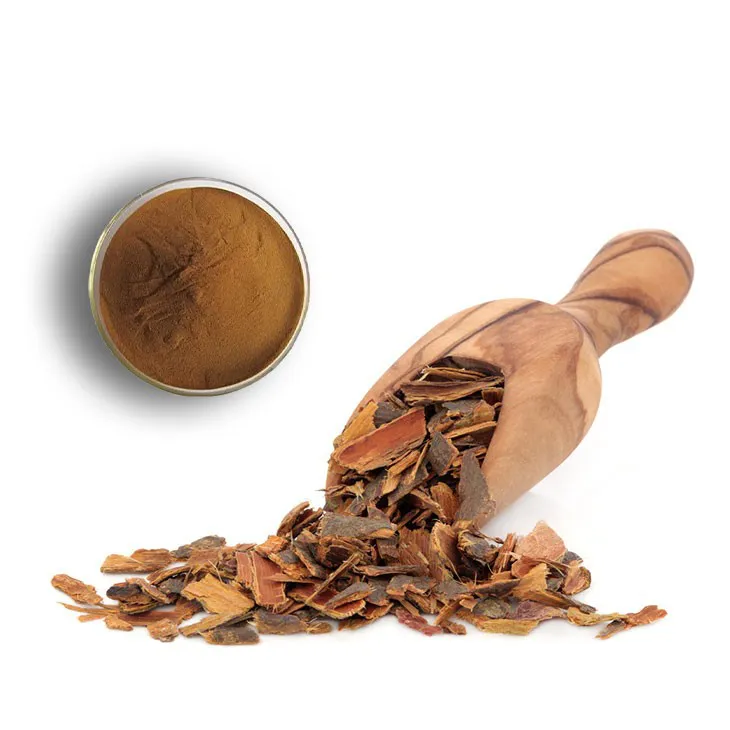- 0086-571-85302990
- sales@greenskybio.com
Does seabuckthorn bark extract have benefits for diabetes? Are these all safe and applicable for diabetic patients?
2024-11-12

1. Introduction
Diabetes is a global health concern, affecting millions of people worldwide. It is characterized by high blood sugar levels due to either insufficient insulin production (Type 1 diabetes) or the body's ineffective use of insulin (Type 2 diabetes). Over the years, researchers have been exploring various natural substances for their potential in managing diabetes. SeaBuckthorn bark extract has emerged as one such candidate, with some studies suggesting possible benefits for diabetic patients. However, it is crucial to comprehensively evaluate its efficacy and safety before making any claims.

2. Possible Mechanisms of Action
2.1. Antioxidant Properties
SeaBuckthorn bark extract is rich in antioxidants such as flavonoids and phenolic compounds. These antioxidants play a vital role in diabetes management. In diabetic patients, there is often an increased production of free radicals due to high blood sugar levels. Free radicals can cause oxidative stress, which in turn can damage cells, including pancreatic beta - cells responsible for insulin production. The antioxidants in seabuckthorn bark extract can neutralize these free radicals, reducing oxidative stress. This may potentially help in protecting pancreatic beta - cells, thereby maintaining or improving insulin production.
2.2. Anti - inflammatory Effects
Chronic inflammation is associated with diabetes. Inflammatory markers are often elevated in diabetic patients. SeaBuckthorn bark extract has been shown to possess anti - inflammatory properties. It can inhibit the production of pro - inflammatory cytokines such as interleukin - 6 (IL - 6) and tumor necrosis factor - alpha (TNF - α). By reducing inflammation, it may improve insulin sensitivity in the body. Insulin - resistant cells are less able to respond to insulin, which is a key factor in Type 2 diabetes. The anti - inflammatory effects of the extract may help in reversing this insulin resistance.

3. Existing Research Evidence
3.1. Animal Studies
Several animal studies have been conducted to investigate the effects of seabuckthorn bark extract on diabetes. In a study on diabetic rats, the extract was administered for a certain period. The results showed that the blood sugar levels of the rats in the treatment group were significantly lower compared to the control group. Additionally, the rats in the treatment group had improved lipid profiles, with lower levels of triglycerides and cholesterol. Another animal study focused on the pancreatic histology of diabetic mice. It was observed that the seabuckthorn bark extract treatment group had less damage to pancreatic beta - cells compared to the untreated group, suggesting a protective effect on these important insulin - producing cells.
3.2. Human Studies
Although human studies on seabuckthorn bark extract and diabetes are relatively limited, some preliminary investigations have been carried out. In a small - scale clinical trial involving diabetic patients, the participants were given seabuckthorn bark extract supplements for a few weeks. The results indicated a slight but significant reduction in fasting blood sugar levels in some of the patients. However, the sample size was small, and more comprehensive and large - scale human studies are needed to confirm these findings. Some observational studies have also reported that in regions where seabuckthorn is consumed regularly as part of the diet, the prevalence of diabetes seems to be lower compared to other areas. While these observational studies cannot establish a direct causal relationship, they do provide some circumstantial evidence.

4. Potential Side Effects
4.1. Gastrointestinal Disturbances
One of the potential side effects of seabuckthorn bark extract is gastrointestinal disturbances. Some people may experience symptoms such as nausea, vomiting, diarrhea, or abdominal discomfort after taking the extract. This could be due to the high concentration of certain compounds in the extract that may irritate the digestive tract. However, the incidence of such side effects may vary from person to person, and not everyone who takes the extract will experience these symptoms.
4.2. Allergic Reactions
Allergic reactions to seabuckthorn bark extract are also possible. People with allergies to plants in the same family or those with a history of general allergies may be at a higher risk. Symptoms of allergic reactions can include skin rashes, itching, swelling, and in severe cases, difficulty breathing. It is important for individuals with a known history of allergies to exercise caution when considering the use of seabuckthorn bark extract.

5. Safety Considerations for Diabetic Patients
For diabetic patients, safety is of utmost importance when considering the use of seabuckthorn bark extract. First, it should not be used as a substitute for conventional diabetes medications without consulting a healthcare provider. Diabetic patients often require a carefully balanced treatment regimen that may include medications such as insulin or oral hypoglycemic agents. Seabuckthorn bark extract, if used, should be considered as a complementary therapy. Second, patients with pre - existing medical conditions such as kidney or liver problems should be especially cautious. The extract may interact with medications used to treat these conditions or may have an impact on the function of these organs. Third, pregnant and breastfeeding women with diabetes should avoid using seabuckthorn bark extract until more research is done on its safety in these situations.
6. Conclusion
In conclusion, seabuckthorn bark extract shows some potential benefits for diabetes based on its possible mechanisms of action and the existing research evidence. However, the current evidence is not conclusive, and more research, especially large - scale human studies, is needed. While it may have potential antioxidant and anti - inflammatory properties that could be beneficial for diabetic patients, there are also potential side effects and safety considerations. Diabetic patients should always consult their healthcare providers before using seabuckthorn bark extract to ensure that it is safe and appropriate for their individual situation.
FAQ:
1. What are the possible mechanisms by which seabuckthorn bark extract might benefit diabetes?
Some studies suggest that seabuckthorn bark extract may contain certain bioactive compounds such as flavonoids and polyphenols. These compounds might have antioxidant properties. Oxidative stress is often increased in diabetic patients, and the antioxidant effect could potentially help reduce cell damage caused by free radicals. Also, it may play a role in improving insulin sensitivity. By enhancing the body's response to insulin, it could help in better glucose regulation. However, more research is needed to fully understand these mechanisms.
2. What evidence from existing research supports the benefits of seabuckthorn bark extract for diabetes?
There have been some in - vitro and animal studies. In vitro studies have shown that components in seabuckthorn bark extract can interact with certain cellular pathways related to glucose metabolism. Animal studies have indicated that seabuckthorn bark extract supplementation can lead to improved blood glucose levels and lipid profiles in diabetic animal models. However, human clinical trials are still relatively limited, and the evidence from these small - scale human studies is not yet conclusive.
3. Are there any potential side effects of seabuckthorn bark extract for diabetic patients?
While seabuckthorn bark extract is generally considered safe in moderate amounts, some potential side effects may occur. It could cause mild gastrointestinal discomfort such as nausea, vomiting, or diarrhea in some individuals. There is also a concern about potential allergic reactions, especially in those who are allergic to plants in the same family. Additionally, since it may interact with medications, diabetic patients taking other drugs (such as blood - glucose - lowering medications) should be cautious and consult their healthcare providers before using seabuckthorn bark extract.
4. How should diabetic patients use seabuckthorn bark extract?
Before using seabuckthorn bark extract, diabetic patients should consult their doctors. If approved, they should follow the recommended dosage. It is important not to exceed the recommended amount as it may increase the risk of side effects. Also, they should monitor their blood glucose levels closely while using the extract to ensure that it is not causing any unexpected changes in their diabetes control.
5. Can seabuckthorn bark extract replace diabetes medications?
No, seabuckthorn bark extract cannot replace diabetes medications at present. While it may show some potential benefits in diabetes management, it has not been proven to be as effective as the established diabetes medications. Diabetes medications are specifically designed to regulate blood glucose levels, and their efficacy has been well - studied through large - scale clinical trials. Seabuckthorn bark extract can only be considered as a complementary approach under the guidance of a healthcare provider.
Related literature
- The Potential of Seabuckthorn in Diabetes Management"
- "Seabuckthorn Bark Extract: A New Hope for Diabetic Patients?"
- "Research on the Efficacy and Safety of Seabuckthorn Bark Extract in Diabetes"
- ▶ Hesperidin
- ▶ citrus bioflavonoids
- ▶ plant extract
- ▶ lycopene
- ▶ Diosmin
- ▶ Grape seed extract
- ▶ Sea buckthorn Juice Powder
- ▶ Beetroot powder
- ▶ Hops Extract
- ▶ Artichoke Extract
- ▶ Reishi mushroom extract
- ▶ Astaxanthin
- ▶ Green Tea Extract
- ▶ Curcumin Extract
- ▶ Horse Chestnut Extract
- ▶ Other Problems
- ▶ Boswellia Serrata Extract
- ▶ Resveratrol Extract
- ▶ Marigold Extract
- ▶ Grape Leaf Extract
- ▶ blog3
- ▶ blog4
- ▶ blog5
-
Organic Tongkat Ali extract powder factory.
2024-11-12
-
How to make powder with ashwagandha extract.
2024-11-12
-
Rosehip extract manufacturers from China.
2024-11-12
-
The best cat's claw extract in nature.
2024-11-12
-
Chinese Dandelion Leaf Extract Suppliers.
2024-11-12
-
Beta Carotene
2024-11-12
-
Hawthorn Extract
2024-11-12
-
Sea buckthorn Juice Powder
2024-11-12
-
Senna Leaf Extract
2024-11-12
-
Chasteberry Extract
2024-11-12
-
Medicinal Marshmallow Extract
2024-11-12
-
Green Tea Extract
2024-11-12
-
Giant Knotweed Extract
2024-11-12
-
American Ginseng Root Extract
2024-11-12
-
Hawthorn powder
2024-11-12





















